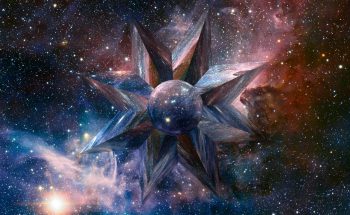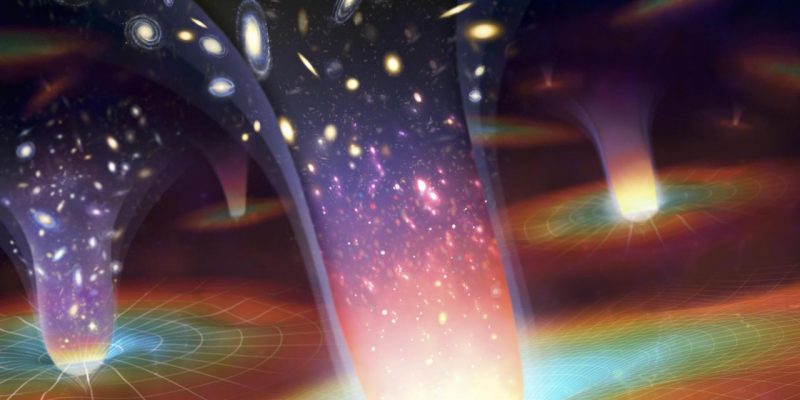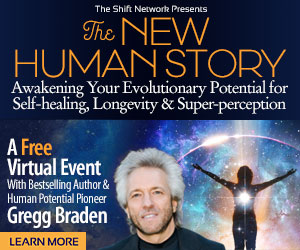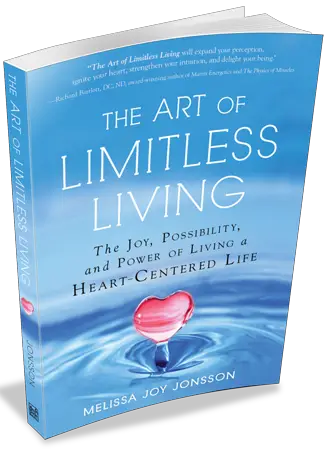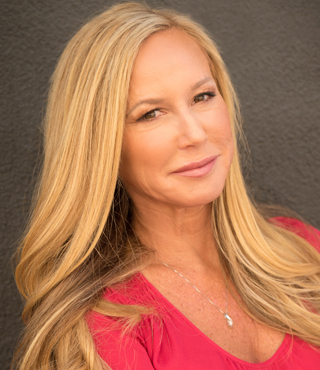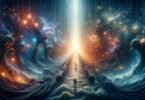Guest writer for Wake Up World
“Love is the affinity which links and draws together the elements of the world. … Love, in fact, is the agent of universal synthesis.” — Pierre Teilhard de Chardin, Activation of Energy
Fluid Boundaries and Concrescence
Concrescence for humanity is possible through the art of letting go. By letting go of preconceived ideas, limiting reality constructs, and rigid notions of reality, we open into the realm of curiosity and creativity where anything can happen. We transform our placeholders to graceholders. By living in our hearts and applying Fluid Boundaries to what appears to be happening, we can move into the gap of the unknown to make new collective heart-prints. There is not just one way to move forward.
Concrescence is defined as “the coalescence or growing together of parts originally separate.” The concept of concrescence originated in biology and was later adopted by philosopher Alfred North Whitehead in his book Process and Reality as part of a philosophical ontology.
Every event in Whitehead’s ontology is thus a unique combination of possibility and actuality. The process of combining the two is imagined by Whitehead to be organic and is consequently called “concrescence.” The term concrescence stands for the process that is fundamental for existence. It can be thought of as the growing together of the multiple entities in the world to one single actual entity, which then becomes the material for new entities. Because of being organic, a concrescence is different from a mere combination where the whole is the sum of its parts.[1]
According to Whitehead, concrescence can occur through creative synthesis where the act of decision merges the already decided past with the not yet decided future.[2]
Human nature is to look to past experiences to create future expectations. We think things will be a certain way because they were that way before. The presence of the past creates the future. But concrescence integrates past experiences not as predictions of the future but as references only to catalyze new potentials, new probabilities, new creative expressions. Many existing perspectives and models working together will build concrescence.
Consider that concrescence is already occurring in many paradigms when viewed from a heart-centered, vertical perspective. None of the models are absolutely true, but all of the models are relatively true for the scale they are describing.
The scale we use to look at reality matters.
Scale is defined as a range of numbers used as a system to measure or compare things. According to world-renowned Harvard professor of theoretical physics Lisa Randall:
Effective theories are keeping track of measurable details without getting caught in unmeasurable components. … The speed of light is finite and the universe we know has existed a finite amount of time. This doesn’t mean the universe isn’t bigger. It is just that we can’t make observations beyond that scale.[3]
A Theory of Everything
Wouldn’t it be great if we had a theory to explain everything? In physics, string theory is currently under development. This model aims to reconcile quantum mechanics with general relativity and seems to have all the necessary characteristics for becoming a Theory of Everything. It is founded on the principle that matter, energy, and, under certain hypotheses, space and time are manifestations of physical entities below which, according to the number of dimensions they develop in, they are called “strings.” For the theory to be valid, physicists propose that there are ten dimensions.[4]
A true Theory of Everything would possibly include all theories, as there is not one ultimate reality. All realities are a matter of scale or, more simply, a matter of perspective. Each model often describes the respective dimension it is observing.
Consider that the evolution of physics and science may simply be an evolution of our perspectives based on scales. Current research builds on and is a logical extension of what is previously known. Current research comes from the past and is based on measurable observations. Aspects of string theory known as super-symmetry and Brane models seem to hold the most promise of being able to build on what is already known and linking to the unknown. However, none of these models can get there alone. They rely on a delicate balance between what has been discovered in the past (predictability) and the unexplained mysteries of the universe (probability).
Predictability and Probabilities
The science of our three-dimensional life is Newtonian physics. Newtonian physics explains how objects obey the laws of gravity. This is the world of physicality and matter. This is a science of predictability.
The science of 4-D is a realm of probabilities. Traditional models consider 4-D to be space-time, which includes four-dimensional combinations of width, height, depth, and time. Because space consists of three dimensions, and time is assumed to be one-dimensional, spacetime must, therefore, be a four-dimensional object. Oxford physicist and mathematician Roger Penrose proposed that space and time themselves are secondary constructs that emerge out of a deeper level of reality. Mathematics professor Andrew Hodges of Oxford University says that “This idea of points of space-time as being primary objects is artificial.”[5]
Quantum physics explores an unknown future of probability states. Quantum entanglement experiments reveal that particles can instantaneously communicate over infinite distances. This is a model of a world in which everything is connected. At the subatomic level, the reason electrons are able to communicate with each other from thousands of miles away is because they are not separate. Quantum physics challenges our basic ideas about space-time. Relativity from a quantum physics perspective reveals a realm of possibilities. This is also a realm of the mind in which probabilities can be explored before they fully actualize as experience. We can traverse the past via memories and explore the future through imagination.
However, moving beyond 4-D is problematic for science due to the measurement problem. But nonetheless, there is compelling evidence that there is more than meets the eye, and portals into infinite dimensions may soon be discovered.
Harvard cosmologist and theoretical physicist Lisa Randall, author of Knocking on Heaven’s Door, posits that there is a hidden fifth dimension that we can’t see. According to her widely recognized model, which dovetails with string theory, “The fifth dimension could be so warped that the number of dimensions you see would depend on where you were. … The fifth dimension could actually be infinite and we would not have noticed it.”[6]
Infinite extra dimensions, depending on our perspective.
Randall has made some astounding discoveries in theoretical physics linking tiny quantum particles to a model of the cosmos. While she utilizes a very pragmatic approach, starting from what science already has proven, her colleagues cite her “amazing nose” in terms of knowing where to look for hidden variables. She has a knowing without knowing how she knows, and her intuitive hunches consistently enable her to follow her nose (knows).
Dimensions are simply the different facets of what we perceive to be reality. We are aware of the three dimensions that surround us—length, width, and depth—because we can see them in everyday life. String theory proposes that beyond these three dimensions are additional dimensions that are not immediately apparent to us but that can be still be perceived as having a direct effect on the universe and reality as we know it.
Consider that that hidden fifth dimension, too small to measure and too vast to quantify, can possibly be found without measuring devices and mathematical computations. This hidden dimension is found in the field of the heart.
The field of the heart is the gateway to infinite potential and infinite expression, as well as infinite dimensions,[7] beyond the realities we can see and measure into the realm of the unknown. The heart-field is where predictability meets boundless possibility.
The heart-field is the timeless transformative treasure that moves us beyond past experiential patterns of linear time into the holofractal realm of new patterned potentials; we are able to move up, down, right, and left, any which way in all dimensions, esoterically and practically, for they are one and the same from the field of the heart. Vertical and horizontal awareness meets perpendicular planes of possibilities simultaneously.
The field of the heart is a counter-rotating torsion field or tube torus. Torsion fields are instantaneous signal transmitters and receivers linking local linear effects with nonlocal, nonlinear reality. Our heart-field enables us to traverse all axes of reality from zero-point to all points of perspectives inclusively.
The heart-field is where infinite potentials meet infinite expressions. Infinite perspectives. Infinite choices. Infinite dimensions.
Curiously enough, the physics of heart-centered awareness, a physics of torsion fields, would conceivably enable scientists to reconcile electromagnetism and gravity and would enable mainstream science to prove the existence of unknown dimensions. More than 4,000 papers have been published by more than 150 teams of scientists in the past 120 years describing what a torsion field is, what function it performs, how it works, and where it may be located. Despite this fact, widespread scientific knowledge of this critical, fundamental aspect of physics and biology has been almost completely excluded from the world of academic scientists and mainstream research institutions.[8]
Torsion fields or scalar waves are still considered “fringe science.” Part of the reason for this is that torsion fields are characteristically supraluminal; they travel faster than the speed of light. Because our measuring devices are based on the electromagnetic spectrum and these tools (based on light) cannot go faster than the speed of light itself, we can’t measure torsion fields. However, we can measure the effects of torsion fields.[9] Nonetheless, mainstream science dismisses torsion fields as junk science. In other words, traditional mainstream science has dismissed the existence of scalar wave energy (torsion fields) simply because current measurement tools are based on electromagnetic frequencies, action, and motion, and these measurement tools cannot seem to measure scalar or torsion waves. As we learned from renowned theoretical physicist Lisa Randall, effective theories are keeping track of measurable details without getting caught in unmeasurable components.
The prevailing scientific paradigm is that which is not measurable must not be included.
According to MIT- and Princeton-educated physicist Dr. Claude Swanson, in his Synchronized Universe model, the new sciences of biophotons and torsion fields provide a bridge between two views of life: the old 20th-century view of an organism as a chemical machine and the emerging view of life as communication and energetic flows.[10]
The physics of torsion fields also reveals how language can reprogram our DNA. Russian biophysicist Peter Gariaev and his team have proven the existence of torsion fields. Gariaev’s work, wave genetics, utilizes the principles of laser light and sound and scientifically demonstrates that torsion fields carry information to the biophotons of the body, informing the body to heal and grow. Despite the fact that he is healing so-called genetic diseases, the dead-end dogma of prevailing paradigms has yet to accept his progressive research into mainstream avenues.[11]
Age of Synthesis
Moving toward concrescence entails our ability to see truth in all models. Moving toward concrescence will entail our ability to occupy multiple perspectives simultaneously. Concrescence at the collective level begins with concrescence at the individual level.
So are things really falling apart, or are they coming together in a new way?
Everything at the collective level is moving toward integration. The historic split between mind and body has melded. Wave particle duality has been resolved. Science and spirituality are merging, and even separate masculine and feminine constructs are evolving in an integrated, holistic manner. There is an emergence of synthesis.
Today, many disparate systems are synthesizing. Nothing seems as separate as it did in the past. The boundaries between so-called opposites are beginning to dissolve, and dualities are transforming into an integrated expression of wholeness.
Scientist Dr. Carl W. Hall considered the 21st century the The Age of Synthesis:
Synthesis is a way of thinking and doing, of providing a vision, in which an idea or a thing, imagined or real, is seen as a coherent whole; often consisting of parts, from which thought can be developed, action can be rejected or taken, and the thing made, assembled, or constructed; either as a new creation or activity or as a duplicate or substitute of known substances.[12]
Fluid Boundaries
To bridge the gaps between all paradigms, fostering synthesis and a movement toward concrescence, we are invited to leverage Fluid Boundaries in relation to our models and maps to describe reality and the way we relate to others.
The art of limitless living includes releasing the fixed boundaries we may have previously established relative to our models and maps, parameters that create a false sense of control over our lives and reality, but that also create a real form of limitation and segregation for collective humanity.
Fluid Boundaries are boundaries that aren’t predefined in anticipation of situations or experiences. In truth, we never know how a circumstance will present itself before it actually happens. At the quantum level, reality is a series of probabilities that only seem to actualize when we observe them. Fluid Boundaries allow us to move freely among the patterns we encounter in the moment so as to allow for maximal flexibility and flow.
Fluid Boundaries at the interpersonal level are a game-changer. We never know what is going to happen in the very next moment. For example, we never really know how another person is going to show up or respond to us. If boundaries are established in advance, those very boundaries may serve to inform and restrict a situation of circumstance, with the preset limitation triggering a reaction. Thus, boundaries can bind us rather than liberate us. Predefined boundaries create separation rather than connection.
For example, we may create boundaries in advance to withstand an expectation of our spouse becoming angry with us, and subsequently guilt-tripping us when we say we would rather stay home next weekend than go to the firing range. The very expectation of the future behavior may indeed be based on prior reactions. Establishing boundaries based on past experiences may actually serve as the trigger for the pattern we were attempting to avoid. This is because an associative reference for the behavior is encoded in the boundary. So instead of avoiding the anger and guilt, the boundary triggers the very pattern we are trying to circumnavigate or avoid.
Conversely, approaching this same anticipated circumstance centered in an open heart, without preconceived notions, with a commitment to notice when circumstances come up as placeholders that may take us out of our hearts, allows for Fluid Boundaries to be created.
When the tendency to move out of the heart occurs, this can serve as a cue to bring in Fluid Boundaries, moving parameters that honor our needs while still allowing others to have their experiences. Fluid Boundaries without expectations can lead to a softening of the interactions, with others wielding very powerful and often surprising results. Whatever the outcome, the possibilities become limitless when navigating with Fluid Boundaries.
References:
- Daniel J. Ott, “Process Communitarianism,” Concrescence 10 (2009): 67–75.
- Alfred North Whitehead, Process and Reality, Corrected ed. (New York: Free Press, 1978).
- Lisa Randall, “Knocking on Heaven’s Door,” lecture at Harvard University, November 2011, https://m.youtube.com/watch?v=FiCNLZMhScI.
- “Looking for Extra Dimensions,” www.superstringtheory.com/experm/exper51.html.
- “SpaceTime, Relativity, and Quantum Physics,” www.ws5.com/spacetime/.
- Dennis Overbye, “On Gravity, Oreos, and a Theory of Everything,” New York Times, November 1, 2005, .com/2005/11/01/science/on-gravity-oreos-and-a-theoryof-everything.html; Lisa Randall, Knocking on Heaven’s Door: How Physics and Scientific Thinking Illuminate the Universe and the Modern World (New York: HarperCollins, 2011).
- Barbara Hand Clow and Gerry Clow, The Alchemy of Nine Dimensions (Charlottesville, Va.: Hampton Roads, 2010).
- David Yurth, Seeing Past the Edge (Mesa, Ariz.: Dandelion Books, 1997); Richard C. Hoagland and David Wilcock, “The Bees’ Needs: It’s the Physics, Stupid!,” https://web.archive.org/web/20191111103104/http://www.enterprisemission.com:80/Bees/thebeesneeds.htm.com/Bees/thebeesneeds.htm.
- P. Gariaev and M. Pitkanen, “Model for the Findings about Halogram Generating Properties,” unpublished manuscript, .
- Swanson, Claude. Life Force: The Scientific Basis. (Tucson, AZ: Poseidia Press, 2011).
- “The Torsion Field and the Aura.” Subtle Energies and Energy Medicine 19, no. 3 (2008): 43–89.
- Carl W. Hall, The Age of Synthesis (New York: Peter Lang, 1995).
This article is excerpted and adapted from ‘The Art of Limitless Living’, available in Print, E-book and AudioBook.
The Art of Limitless Living: The Joy, Possibility, and Power of Living a Heart-Centered Life
Join inspiring, life-transformational leader Melissa Joy on a journey to the heart of interactive reality creation, where self-love is the new normal.
Humanity is in a position that we have never been before, in new and unfamiliar terrain. You may be at a place in your life where you are aware that “tried and true” behaviors and beliefs no longer work. You may be confused, and unsure how to proceed.
Through a brilliant weave of unique language, testimonials, and practical play-based exercises, The Art of Limitless Living provides multiple access points for creating new self-loving maps to help you navigate through changing and challenging landscapes.
Buy now at: Amazon • Barnes & Noble • Indiebound
Click here for details of upcoming The Art of Limitless Living author talks and book signing events.
Recommended articles by Melissa Joy Jonsson:
- Empathy and the WE Experience
- Morphic Resonance: Change the Current and Reality Conforms
- Love Waves In Our Hologram
- Reality and Experience – Morphic Fields and The Power Of Choice
- Relationships: Co-Creation, Unification, and Ripples In The Pond
- Time Travel Through the Eternal Now
- Heart-Centered Awareness – Our Portal to Joy
- Love, Creation and Morphic Resonance – The Formula for All Matters in The Love Hologram
About the author:
Melissa Joy Jonsson is the founder of M-Joy, a unifying “we” movement that provides a new language to experience self-love as integrity. She is best known for her ability to engage people to embrace their true authentic power by playing in the field of the heart. Melissa has been teaching popular life-transformational seminars around the world since 2008. As an intuitive coach and holistic practitioner, Melissa has a diverse client base in more than 25 countries. Melissa spent more than a decade as an executive in the pharmaceutical industry. She is the author of “The Art of Limitless Living”, “Little Book of Big Potentials”, “Practical Play the Heart-Centered Way”, and “M-Joy Practically Speaking”. Melissa has a bachelor’s degree in psychology from the University of California at Santa Barbara. She resides in San Diego, California.
To learn more, please visit www.MJoyHeartField.com.

If you've ever found value in our articles, we'd greatly appreciate your support by purchasing Mindful Meditation Techniques for Kids - A Practical Guide for Adults to Empower Kids with the Gift of Inner Peace and Resilience for Life.
In the spirit of mindfulness, we encourage you to choose the paperback version. Delve into its pages away from screen glare and notifications, allowing yourself to fully immerse in the transformative practices within. The physical book enriches the learning process and serves as a tangible commitment to mindfulness, easily shared among family and friends.
Over the past few years, Wake Up World has faced significant online censorship, impacting our financial ability to stay online. Instead of soliciting donations, we're exploring win-win solutions with our readers to remain financially viable. Moving into book publishing, we hope to secure ongoing funds to continue our mission. With over 8,500 articles published in the past 13 years, we are committed to keeping our content free and accessible to everyone, without resorting to a paywall.

